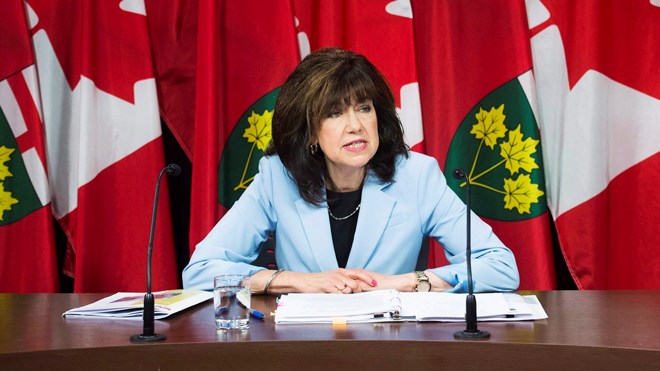Ontario's auditor general has issued a damning report on the handling of the COVID-19 pandemic by Ontario's Doug Ford government. The 107- page document was tabled today by Auditor General Bonnie Lysyk
While the report acknowledged that the pandemic was unprecedented in scope around the world, it also said Ontario was just not prepared to deal with it.
"Unfortunately, neither the Ministry of Long-Term Care, nor the long-term-care sector was sufficiently positioned, prepared or equipped to respond to the issues created by the pandemic in an effective and expedient way," Lysyk wrote in the report.
"By late March 2020, when COVID-19 had begun its ravage of long-term-care homes, it became blatantly obvious that aggressive infection prevention, detection and patient care actions were needed — and needed quickly — to prevent staggering death rates from becoming the norm across Ontario’s entire long-term-care community," Lysyk continued.
Her report identified three key concerns.
One of the key issues said Lysyk is that Ontario failed to learn much from the recommendations of the SARS Commission led by Mr. Justice Archie Campbell, that was made public in 2007.
The second key issue she said was that repeated concerns raised about the weaknesses in Ontario's long-term care system were not adequately addressed in the past 12 years.
Lysyk said the third key issue was a lack of integration by the long-term care sector within Ontario's health care sector, which meant LTC homes did not benefit from the "lifesaving expertise" in infection prevention and control that have been provided to a greater extent in hospitals and health units.
The auditor general's report has come out just two days ahead of the formal report that is expected from the Ontario Long-Term Care COVID-19 Commission, which was established last August and is due to present its official report on April 30. Some government critics have suggested the commission report might try to downplay the overall seriousness of the pandemic.
Later on Wednesday Lysyk took part in a news conference where she said there was little guidance from the province on what LTC homes should be doing.
Lysyk said that direction from Dr. David Williams, Ontario's chief medical officer of health (CMOH) was "often unclear" in the first wave of the pandemic and provided little guidance to LTC homes.
Lysyk said another shortcoming was that LTC homes were not required to prepare for the pandemic as part of any emergency planning. She said this was despite the fact that the eventuality of a pandemic had been very clear to decision-makers since SARS.
"Infection prevention and control measures were not consistently practised, understood or fully inspected in long-term care homes, even prior to the COVID-19 pandemic," said Lysyk. She said Infection Prevention and Control (IPAC) was a significant issue.
"Initially that direction all too often left decisions to long-term care home operators and most of these operators did not have sufficient IPAC specialists in their homes," said Lysyk.
During the follow-up news conference, Lysyk was asked if there was anyone to blame. Lysyk said the issues in long-term care homes had been ongoing for a long time.
"I think what we have here is a history of issues not being addressed in a timely way and I think COVID has just demonstrated the importance of making improvements when we know that improvements are needed in the long-term care sector," she said.
She said looking back there were "probably issues" around why the SARS recommendations were not implemented (January 2007).
Lysyk added that long-term care has "taken a back seat" in Ontario's health care system and there is now a lot of room for improvement.
Looking forward, Lysyk said accountability has to be enforced.
"I think accountability has to be increased. I think it needs to be increased and demonstrated by ensuring that seniors in the homes will be cared for appropriately going forward" and this would include an understanding that there will be consequences if this does not happen, she said.
Len Gillis is a Local Journalism Initiative reporter at Sudbury.com, covering health care in Northern Ontario. The Local Journalism Initiative is funded by the federal government.
